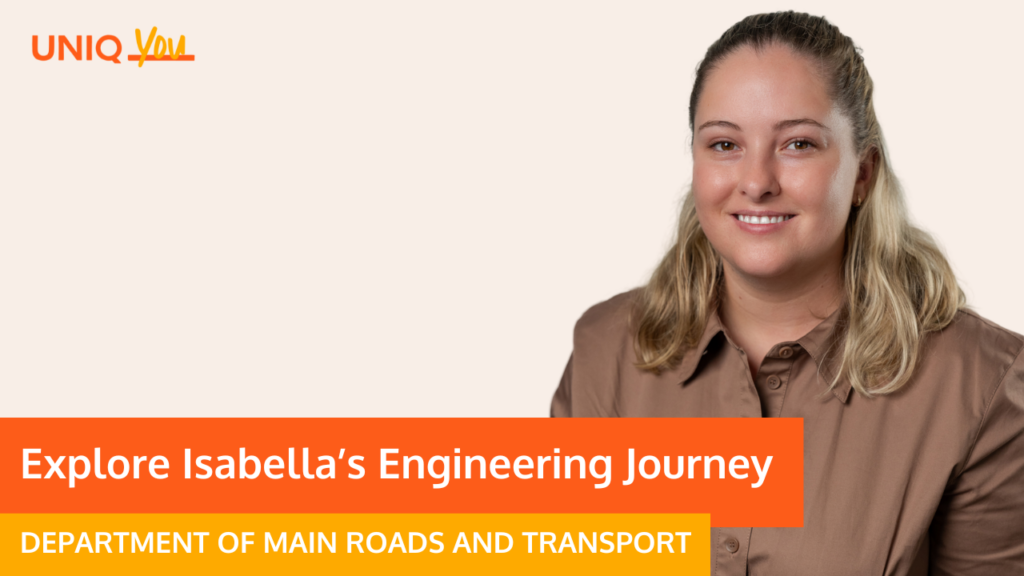From Cadet to Civil Engineer: My Pathway into Engineering
I took an unusual pathway into engineering. After high school, I initially studied a nursing and public health degree. However, after completing a few placements, I realised that a career in nursing and public health wouldn’t provide the challenges that I was looking for. I’ve always been more of a problem solver and had a strong interest in mathematics during school. While deciding on my next steps, I was offered the opportunity to become a Cadet Construction Technician in RoadTek within TMR. This experience solidified my decision to pursue my Bachelor of Engineering (Honours) majoring in Civil Engineering, as I recognised it as field full of professional opportunities.
Through this cadetship, I’ve worked on a range of projects such as pavement rehabilitations, culvert replacements, and even a bridge construction project. After graduating in 2023, I transitioned to a graduate civil engineering role. I am currently in the maintenance team and my role is all about ensuring state controlled roads remain safe and functional for the public.
A Day in the Life of a Civil Engineer
A typical workday in my life varies significantly depending on whether I am in the office or out in the field. When I am in the office, my day involves responding to maintenance inquiries, contacting contractors about current or upcoming works and making phone calls to inspectors who are in the field. On other days, I am out in the district, inspecting maintenance inquiries, investigating issues on the road network and visiting ongoing construction projects to assess progress and discuss any onsite concerns with contractors.
Where Has Engineering Taken Me?
While working for RoadTek, I was based in South-West Queensland, which meant I had the opportunity to travel extensively throughout the region. I’ve visited places like Quilpie, Cunnamulla, Augathella, Injune, St George and Roma. Some of these locations are quite remote and without my role at RoadTek, its likely I wouldn’t have ventured so far west until later in life. But travelling to these areas have made me appreciate Australia that much more. I have also been fortunate to travel to Melbourne and Cairns for work, which provided a refreshing change of scenery.
Challenges Along the Way
I strongly believe that early in your career, it’s important to gain as much experience as possible across different teams. Unfortunately, I have found myself in situations where I am taking on great opportunities, but I haven’t had the chance to rotate through the different teams as I would have liked. One of the challenges I’ve faced in my career so far is championing myself.
High School Subjects That Helped Me
In high school, I studied English, Maths B and C, Biology, Physics, and Chemistry. While Maths C and Physics were helpful in my first year of engineering, they weren’t essential. I studied alongside mature-age students who hadn’t studied those subjects in years and still succeeded. Ultimately, every subject you study in school will help you in both your career and life. Whether it be writing reports, working in groups, problem solving, or gaining a general understanding of how the world works, these skills will support you throughout your career and life.
Advice for Young Women Considering Engineering
- Review your first-year subjects: Take a look at the courses offered in your first year within your chosen discipline. Depending on the university, many courses may overlap across the different engineering disciplines. For example, if you start with civil engineering but later decided to pursue electrical engineering, you’ll likely find that you’ve already studied the same courses during your first year.
- Get hands on early: Seek out internships, cadetships or work experience as soon as you can. The practical exposure will help you gain insight into the industry and assist you in determining where you want to go in your career.
- Embrace opportunities across teams: Early in your career, make the most of opportunities to work in different teams or areas. The diverse experience you gain will be invaluable. Later on in your career, it may become more challenging to move between different areas as you progress in your career.
Career Highlights
Some of my career highlights so far include:
- Working on a bridge construction project early in my career, an opportunity that is rare in South West Queensland.
- Managing a multi-million-dollar pavement rehabilitation project in my final year of university.
- Graduating with great results while working full-time.
- Working with talented colleagues who have helped me grow personally and professionally.
What I Wish I Knew Earlier
Engineering is more than just maths and physics. On any given day, my work involves communication, finance, project management, contract management, data analysis and reviewing legislation, just to name a few activities. Unfortunately, engineering is often not marketed to women in schools, based on the misconception that “women don’t enjoy maths and science”, which is simply not true. It’s a shame, because a career in engineering is highly rewarding and filled with fascinating challenges and opportunities.
Final Thoughts
For any young woman considering a career in STEM, we encourage you to take the leap. Engineering is an incredibly rewarding field with diverse career paths, the opportunity to make a real impact, and the chance to continuously learn and grow. If you’re curious, proactive, and love problem-solving, engineering might just be the perfect fit for you!
